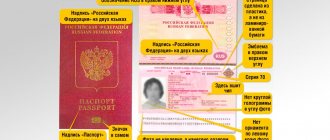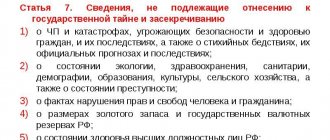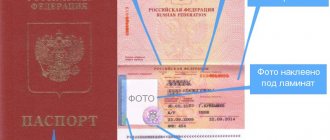Is it possible for Russian military personnel to travel abroad?
These are mainly defaulters on loans, alimony and other financial obligations, whose debt amount has reached 30,000 rubles or more.
- Persons who provided false information when preparing documents.
The FSB Border Service monitors compliance with the bans.
This topic is discussed in more detail in the article “Ban on traveling abroad.” It is impossible to answer the question why military personnel cannot travel abroad in a nutshell. A travel ban is a necessary measure to ensure state security. We live in a world where there is constant confrontation between major powers and various local military conflicts.
The Russian army has received upgrades to its weapons in recent years, and is therefore of serious interest to foreign intelligence services. Thus, the restriction on military personnel traveling abroad is due to the fact that they may have information:
- on the development of new promising types of weapons;
- on the technological equipment of strategic forces and their nuclear arsenal;
- about the locations of special facilities of the Ministry of Defense.
- on the location of military units, the degree of their security, as well as the number of military personnel and military equipment;
- about the strategic plans of the General Staff of the Ministry of Defense for the deployment of certain types of troops, as well as the degree of their readiness to carry out assigned tasks;
Not all countries in the world pursue a friendly policy towards Russia.
Passport storage
The procedure for storing and issuing passports is also regulated by legal acts of the relevant federal bodies.
So, for example, military personnel and civilian personnel of the FSB bodies, who have access to information of special importance and (or) top secret information, hand over their passport for storage to the personnel department of the security agency within five days after receiving it from the authorized state bodies, as well as after returning from trips abroad.
Civilian personnel with security clearance shall deposit their passports with the personnel department of the security agency within five days after a decision is made to temporarily restrict the right to travel abroad.
A passport in storage is issued to military personnel for traveling abroad if there is a decision on the possibility of traveling abroad.
Expert opinion
Kuzmin Sergey Yaroslavovich
Lawyer with 8 years of experience. Specializes in the field of civil law. Legal expert.
Upon returning from a trip abroad, military personnel within five days submit to their immediate superior a report on travel abroad (clauses 7 - 9 of the Instructions, approved by Order of the FSB of Russia dated April 17, 2012 N 179).
How to apply for a passport and what is its validity period? Find out →
How to fill out an application for a new generation passport? Find out →
Due to the difficult geopolitical situation in the world during the holiday period, the question is often asked whether military personnel can travel abroad. Every citizen has the right to freedom of movement both within the country and abroad.
In exceptional cases, this right may be limited by law. In the case of military personnel, the ban on visiting certain states is associated with the need to maintain Russia’s defense capability and ensure the safety of officers.
- Common reasons for banning foreign travel
- Reasons for restricting the departure of military personnel
- Restriction period
- In which countries are military personnel allowed to vacation?
- Which countries are military personnel prohibited from traveling to?
- How to obtain permission to travel abroad
- Good to know
- Where can military retirees relax?
- How should a military personnel behave abroad while on leave?
- Is it possible for military wives to travel abroad?
- Conclusion
Permitted countries for military personnel
The list of such countries is established by the Ministry of Foreign Affairs and is regularly modified.
Currently it contains a fairly impressive list. Why military personnel are not allowed to go abroad Attention
Among the popular destinations among tourists, the following countries are allowed for visiting by the Russian military:
- Tunisia.
- EurAsEC countries.
- United Arab Emirates, etc.
- Thailand.
- Vietnam.
- Dominican Republic.
There will be no obstacles when visiting Belarus, because...
Legally, we have created a single state with this country.
Countries that are not recommended for visiting carry out a sanctions policy towards Russia or are part of unfriendly blocs. These include almost all countries of Western and Central Europe, the USA, Canada and a number of others.
How to arrange a trip After a serviceman has chosen a country to visit that is permitted by the authorities, he needs to follow the procedure by properly arranging this trip at the place of duty. Traveling abroad for the military is important
The procedure for military personnel, police officers, and persons with access to state secrets to travel abroad Military personnel of the Armed Forces of the Russian Federation and federal executive bodies that provide for military service, with the exception of persons undergoing military service
Procedure for obtaining travel permission
For employees of the above-described structures who have access to state secrets, restrictions on foreign travel are lifted in the following order.
- A civil servant who plans to travel abroad must write a statement (report) addressed to his manager. The document records the following information: the country chosen for the visit; Purpose of Travel; date of departure and return; source of financing; transport; details of the travel agency inviting the person.
- The command puts a note on the report about the degree of access to the secrets of the employee’s state, in case of a positive decision - a permit visa, and transfers it to the personnel department of the institution.
- An authorized employee checks the report and notes the presence or absence of restrictions on foreign travel, on the basis of which permission or refusal is issued.
There are other restrictions for citizens of the Russian Federation when traveling abroad. They are imposed on individuals regardless of their place of work and are regulated by the presence of bank, utility debt, unpaid fines, taxes, and alimony. Where can I check my debt before traveling abroad? Every citizen should be aware of the existence of obligations, but, nevertheless, when planning a vacation with a trip abroad, you should clarify whether there are any restrictions due to debts.
There are different verification methods. The easiest way is via the Internet. Online checks can be done by departments on their official websites: tax service, bailiffs. You can check unpaid fines at State Services. You can quickly check whether you have bank debt through the credit history service.
If there are no restrictions, what documents are needed when traveling abroad? In addition to a foreign passport, when traveling to a country with a visa regime, you must obtain a visa, a tourist voucher, an invitation, and medical insurance. These are the main documents, the list of which can be expanded, since additional requirements are imposed for visiting some countries.
Tags: travel abroad, vacation
- 44-FZ VAT NDFL advance car alimony business marriage money children housing contract will housing plot property claim apartment benefit medicine management motivation tax taxes inheritance education clothing pensions pension payments purchase allowance bonus crime trial psychology work advertising deal family court tender labor accounting school
Current restrictions for military personnel to leave the country
It is stated that if a person has access to classified information, the ban period is 5 years.
Upon completion, the restriction is lifted, and the citizen can freely leave the territory of the country. In the same paragraph 1 of Art. 15 clarifies the possibility of extending the secrecy period to 10 years. This is the maximum period during which someone with access to state secrets will not be able to freely leave the territory of Russia.
another category of persons liable for military service is established who are prohibited from leaving the country.
It includes citizens called up for military service.
The restriction also applies to those sent to alternative civilian service. A ban on leaving the country occurs until the citizen completes his military service. By implication, any officials with security clearance may have their rights limited.
One of them is the opportunity to travel abroad. This condition is always fixed in the employment agreement or contract. Employees of the following departments are also restricted from traveling abroad:
- FSIN;
- Russian Guard;
- FSO;
- Defense Department.
- Foreign Intelligence Service;
- Ministry of Emergency Situations;
- Ministry of Internal Affairs;
IMPORTANTPersons working in the specified structures, if they have access to secret information, do not have the right to leave the country until the secrecy period expires.
Military personnel without access to secrets are also limited in their right to visit certain foreign countries.
For
Receiving a passport
Military personnel independently obtain a passport (new or old), attaching the necessary documents and the above certificate to the corresponding application. The registration and issuance of a passport is carried out by the Ministry of Internal Affairs of Russia (p.
11 Order; p.p.
24, 28.1.1 - 28.3.7, 30 of the Administrative Regulations, approved. By Order of the Federal Migration Service of Russia dated March 26, 2014 N 211; P.
clauses 24, 26, 27, 28 of the Administrative Regulations, approved.
By Order of the Federal Migration Service of Russia dated October 15, 2012 N 320; pp. 49 p.
11 Regulations, approved. Decree of the President of the Russian Federation dated December 21, 2016 N 699).
The period for obtaining a passport for a citizen who has (had) access to information of special importance or top secret information classified as state secrets should not exceed three months from the date of filing an application for a passport (Part 5 of Article 10 of Law No. 114-FZ).
List of countries allowed for military personnel to travel
However, this does not mean that the right to leave has been completely lost; it is only burdened with some restrictions.
Having received an answer to the question of whether military personnel can travel abroad, often, especially ordinary citizens or family members of military personnel, do not fully understand what any restrictions on movement are associated with, because this violates their right to freedom of movement. First of all, a citizen undergoing military and equivalent service has given voluntary consent to the effect of such a restriction on him.
We recommend reading:
In addition, there are objective factors that provide the basis for such restrictions:
- A foreign state is a member or candidate member of an unfriendly military bloc (currently recognized as such by NATO).
- The need to maintain secrets protected by law and the state, the bearers of which (of one or another level of secrecy) are almost all military personnel.
- A number of states are pursuing unfriendly, from the point of view of our government, policies towards Russia, so being in them is unsafe for the military personnel themselves.
- Our state does not have appropriate extradition treaties with all countries, so Russia cannot receive a criminal (including a military one) to punish him in his homeland.
One way or another, the state ban is established solely in the interests of the state and is not intended to in any way infringe on the interests of this category of Russian citizens.
Why don't they release
The law does not specify specific reasons why military personnel cannot leave the country. Taking into account the practice and policy of the state, it is assumed that the prohibition is in effect to:
- Protection of state secrets: restrictions on the right to leave the country should be considered as one of the measures to protect state secrets, designed to protect it from declassification. Persons possessing secret information voluntarily agree to the restriction, therefore such measures are legal.
- Protection of military personnel. Representatives of the Armed Forces, FSB officers, police officers and other persons who are military personnel and equated to them, given the current military-political situation, may become the target of recruitment or encroachment by the intelligence services of hostile foreign states.
- Ensuring decisions of draft commissions. The entry ban begins to apply from the moment a citizen becomes a conscript, that is, after the draft commission makes a decision on conscription. Draft evasion is a criminal offense. To prevent a citizen from escaping conscription abroad, there is a restriction on travel.
Please note that travel restrictions are not the only restrictive measure. So, many are interested in whether military personnel are prohibited from owning real estate abroad.
This ban applies in Russia to all civil servants. Moreover, for employees of the FSB and state security, the presence of real estate outside the Russian Federation is fraught with dismissal and alienation of property within the time limits established by special laws.
List of countries allowed for military personnel to travel
For military personnel, there is a list of countries where it is prohibited to travel, but there are also territories where there are no restrictions.
The grounds for a travel ban are:
In other situations, a temporary restriction of the right to leave is implemented by the authorized bodies in the field of internal affairs.
The authority must issue a notice with the grounds and period of restrictions. Why are there restrictions?
- Some countries have extradition treaties.
- It is necessary to maintain state secrets.
- Foreign countries are members of NATO.
- States are pursuing unfriendly policies.
The ban was established in the interests of the country. There is no purpose in infringing on the rights of a certain category of citizens.
A military man, of course, has the right to leave the country, but the trip may result in unpleasant consequences, such as dismissal or the initiation of a criminal case. The period for restriction should not exceed five years from the date the person became familiar with the information. If it is necessary to extend the period, it should not be more than ten years.
For whom travel is restricted
Before leaving the country, in order to avoid excesses when crossing the state border, it is recommended that you familiarize yourself with the list of restrictions established by law. They are determined by the provisions of Art. 15 Federal Law “On the procedure for leaving the Russian Federation and entering the Russian Federation.” According to it, military personnel are prohibited from traveling abroad if they:
- called up for military service or assigned to civilian service as an alternative;
- are employees of the FSB;
- serve under a contract and, due to their official duty, are allowed access to particularly important or top secret information that is a state secret.
Expert opinion
Kuzmin Sergey Yaroslavovich
Lawyer with 8 years of experience. Specializes in the field of civil law. Legal expert.
In the latter case, access to secret information presupposes the conclusion of an employment contract, which provides for some restrictions on civil rights.
Moreover, according to paragraphs. 5, 7 of the Instructions approved by Decree of the Government of the Russian Federation No. 63 of 06.02.
2021, in case of obtaining access to secret and sensitive data, the person must agree in writing to partial restrictions on his own freedoms. Responsibilities regarding such restrictions are prescribed in the employment contract or in the form of an additional document signed by the secret keeper.
Among such bans is the restriction of travel outside the Russian Federation for military personnel.
Each citizen who, for the above reasons, is limited in the right to leave Russia due to his place of service or storage of state secrets, the territorial body of the Ministry of Internal Affairs sends a notification that defines specific restrictions, the reasons for their occurrence and the period of their validity.
Duration of restrictions
Each of the above categories has its own limitation period. The validity period of the restriction on military travel abroad is determined by Art. 15 Federal Law “On the procedure for leaving the Russian Federation and entering the Russian Federation” and amounts to:
- for conscripts, including under the ACS - from the moment the draft commission makes a decision on conscription until the end of their term of service;
- for FSB employees - until the end of the employment contract;
- for persons admitted to secret information - before the expiration of the restriction period in the employment contract. In most cases, it does not exceed 5 years from the date of the last acquaintance with secret documents. If the secrecy remains relevant even after the expiration of this period, it can be increased, but in total it should not be more than 10 years.
Permitted countries for military personnel
Is it possible for Russian military personnel to travel abroad? In other words, many military personnel authorized to work with secret documents initially gave their written consent to restrictions on non-disclosure of secrets, including a ban on traveling outside the Russian Federation (within five years from the date of last awareness).
I would like to note that not everything is so “sad” in this case either.
Looking for cheap flights?Looking for cheap flights? At the same time, officers and members of their families were reimbursed for travel to their place of rest.
In 2006, Chief of the General Staff Yuri Baluevsky approved a list of 21 countries where secretaries could vacation: Armenia, Azerbaijan, Andorra, Belarus, Bulgaria, Greece, Hungary, Egypt, Spain, Italy, Cyprus, China, Latvia, United Arab Emirates , Slovakia, Turkey, Tunisia, Ukraine, Finland, Croatia and the Czech Republic.
In 2009, Anatoly Serdyukov decided to ban the travel of secret carriers abroad and ordered the preparation of a corresponding directive, but it did not pass legal examination and was not signed.
Nevertheless, in 2011, Serdyukov signed order No. 250, according to which only the Minister of Defense could give permission to an officer to travel abroad.
Where can police and military personnel vacation abroad in 2021? Allowed to visit the following states: Abkhazia; Azerbaijan; Armenia; Belarus; Brazil; Vietnam; Dominican Republic; India; Indonesia; Jordan; Cambodia; Kazakhstan;
conclusions
An absolute taboo on traveling abroad applies to those military personnel who are involved in keeping state secrets, as well as conscripts. Other categories of military personnel can spend their holidays abroad. However, they will have to face restrictions on vacation destinations (they will have to choose among the countries that are included in the list of those recommended for visiting by military personnel) and overcome bureaucratic obstacles associated with obtaining permission from management to travel outside of Russia.
Traveling abroad for military personnel in 2021 2021
determines that in order to cross the border of the Russian Federation, a citizen must have a service or diplomatic passport. For military personnel of the Armed Forces of the Russian Federation, except for those serving on conscription, as well as for employees of federal executive authorities and federal state bodies, if they have military service, the procedure for traveling abroad begins in accordance with Art.
Previously, residents of these settlements often traveled abroad, since other countries are located closer to them than to the rest of Russia.
The list of countries prohibited from leaving includes members of the UN, the European Union, the USA, South America and Australia.
Travel to alternative destinations is permitted.
For example, security forces can freely vacation in the Maldives, Tunisia and Vietnam. The list of countries allowed for employees to travel to in 2021 (according to Order No. 360 of the Ministry of Internal Affairs of the Russian Federation) also includes:
- Morocco;
- Palestine;
- Macedonia;
- Bosnia and Herzegovina;
- Israel;
- China;
- UAE;
- Myanmar;
- India;
- Croatia;
- Puerto Rico.
- Cambodia;
- Indonesia;
Employees of the Ministry of Internal Affairs and the Armed Forces can also go on vacation to warm CIS countries, for example, Georgia, Ossetia and Abkhazia. The time for coordination with the FSB is not regulated.
You may receive a resolution “AGREED,” or you may be denied approval without explaining the reasons. If the coordination with the FSB is successful, then a document confirming this approval will be sent to your military unit. Next, a certificate is issued for the FMS.
Where can military personnel travel in 2021: list of permitted countries
Despite the right of free movement guaranteed to every citizen by the Constitution of the Russian Federation, the law also allows in exceptional cases to limit this right. This is not necessarily a punishment - travel can also be restricted in the case of military service or equivalent service in law enforcement agencies and the security service.
We offer to understand why military personnel are not allowed to travel abroad, what exceptions are provided, what is the procedure for leaving, and who is generally prohibited or restricted from traveling abroad. The head of the Ministry of Internal Affairs of Russia, Vladimir Kolokoltsev, has approved a list of countries where employees of the Ministry of Internal Affairs are allowed to travel in 2021. The list lists 13 states that are considered safe for police officers.
We recommend reading: Euda apply to establish paternity
Among them: Vietnam, Cuba, China, Abkhazia, Azerbaijan, Armenia, Belarus, Kazakhstan, Kyrgyzstan, Tajikistan, Turkmenistan, Uzbekistan and South Ossetia.
According to the approved list, civil servants can also go on vacation. I would like to recall the fact that Russian police officers were prohibited from going on vacation in the spring of 2014 due to the international political situation. Please note that if a citizen has been denied permission to leave the country, he can appeal the refusal.
Cancellation of the ban on military personnel traveling abroad, according to Art.
17 of the Federal Law “On the procedure for leaving the Russian Federation and entering the Russian Federation”, it is possible by way of appeal to the Interdepartmental Commission or in court.
The ban on military personnel leaving the Russian Federation is, firstly, due to the protection of state secrets, and secondly, the safety of the military personnel themselves. However, the ban is only a form of restriction: even those contract servicemen who have access to military or state secrets can leave the country, but to do this they will need special permission from the command.
In addition, they can visit a limited list of countries - this is the requirement of the Ministry of Defense. Share:
(16 ratings, average: 4.88 out of 5)
Loading.
Submitting a report
If the report is submitted by a serviceman who is aware of information of special importance or top secret information, then the decision of the official to leave the Russian Federation and the possibility of issuing a passport or to temporarily restrict the right of the serviceman to leave the Russian Federation is made on the basis of documented facts of the serviceman’s access to the specified information, taking into account their relevance at the time of consideration of the submitted report (clause
3 - 5 Order, approved. Order of the Ministry of Internal Affairs of Russia N 378).
The decision to restrict the right to leave the Russian Federation can be appealed to the Interdepartmental Commission, as well as to the court (Article 17 of Law No. 114-FZ; clause 7 of the Procedure).
If an authorized official has given permission to obtain a passport, the endorsed report is submitted to the personnel authority (clause 8 of the Procedure).
Military personnel who are aware of classified information or who are not aware of information constituting a state secret also submit a report to the authorized official. At the same time, the head of the security-secret unit makes a note on the report about the lack of access to information of special importance or top secret information.
The submitted report is endorsed by an authorized official and transferred to the personnel authority (clause p.
13, 14 Order).
Permitted countries for military personnel
In addition, many countries have extradition treaties with countries with which Russia has tense diplomatic relations, in connection with which military personnel may be provoked and their personal safety may be at risk. The second form of clearance implies awareness of top-secret information, which cannot in any way be threatened by hostile intelligence services of foreign states. In 2021, the list of countries prohibited for military and police holidays is as follows: AustraliaAustriaAlgeriaAlbaniaAngolaAndorraAntigua and BarbudaAfghanistanArgentinaBahamasBarbadosBangladeshBahrainBelgiumBelizeBeninBoliviaBulgariaBosnia and HerzegovinaBotswanaBruneiBrazilBurkina FasoBurundiBhutan AtikanVanuatuUnited KingdomVenezuelaHungaryEast TimorGabonHaitiGambiaGuyanaGhanaGuatemalaGuinea-BissauGuineaGermanyHondurasGrenadaGreenlandGeorgiaGreeceDenmarkDjiboutiDominicaDominicananaEgyptZambiaZimbabweIsraelIndonesiaIndiaJordanIranIraqIrelandIcelandSpainItaly I YemenDPRKCape VerdeCambodiaCameroonQatarCanadaKenyaCyprusKiribatiColombiaCongoComorosCosta RicaKosovoIvory CoastCongoKuwaitCubaLatviaLaosLesothoLiberiaLibyaLebanonLithuaniaLiechtensteinLuxembourgMauritiusMauritaniaMadagascarMacedoniaMalawiMalaysiaMald willowsMaliMaltaMoroccoMarshall IslandsMicronesiaMexicoMozambiqueMoldovaMongoliaMonacoMyanmarNamibiaNauruNepalNigerNetherlandsNigeriaNicaraguaNiueNorwayNew ZealandUAEOmanPakistanPanamaPalauPapua New Guinea ParaguayPeruPolandPortugalRomaniaRwandaSalvadorSamo aSao Tome and PrincipeSan MarinoSaudi ArabiaSwazilandSeychellesSenegalSaint Vincent and the Grenadines Saint Kitts and Nevis Saint Lucia Serbia Singapore Syria Slovenia Slovakia Solomons Somalia USA Sudan Suriname Sierra Leone Thailand Tanzania Tonga Togo Trinidad and Tobago Tunisia Tuvalu Turkey Ukraine Uganda Uruguay Fiji Philippines France Finland Croatia Chad Montenegro Che ChileSwedenSwitzerlandSri LankaEcuadorEquatorial GuineaEstoniaEritreaEthiopiaSouth KoreaSouth SudanSouth AfricaJapanJamaica
Features of travel abroad by employees of the Ministry of Internal Affairs and other structures in 2021
This right can be exercised by representatives of the Ministry of Emergency Situations, the Ministry of Internal Affairs, the Federal Penitentiary Service, the FSB, and the Ministry of Internal Affairs. Access to state secrets is not the only reason why employees of special institutions are not allowed to leave Russia.
Restrictive measures may be associated with a deterioration in the political situation in potential host countries.
But refusal on these grounds is not a serious obstacle to a tourist voyage. A civil servant does not have the right to cross the border of the Russian Federation for about 5 years from the moment he became aware of data of particular importance.
For military personnel, the restriction is lifted after their demobilization.
Representatives of the interdepartmental commission responsible for protecting state secrets can, in certain cases, extend the specified period for security forces, but in total, the prohibitive measure should not last more than 10 years. Since the restriction of freedom of movement for civil servants is not supported by imperative norms, they have the right to go to countries with which the Russian Federation has established diplomatic and friendly ties. There are about 27 of them (Kazakhstan, Vietnam, Cuba, China, Abkhazia, etc.).
Moreover, a trip abroad must be approved by higher authorities.
Not everyone knows which one. Soldiers and officers have the right to go to Belarus, Armenia, Brazil, and Sri Lanka. In contrast to the question: “Which countries can military personnel travel to?”, many are interested in the number of foreign powers that they are not allowed to visit.
The blacklist is based on the United States and NATO member countries.
Good to know
Where can military retirees relax?
After a certain time, career military personnel complete their service and retire to the reserve. However, holidays for military pensioners abroad are possible only after the end of the current restrictions regarding persons who have access to state secrets.
For this reason, in order for the Federal Migration Service of Russia to issue a foreign passport to former military personnel, 5-10 years must pass from the date of dismissal. After the expiration of this period, it is already possible to leave the homeland without approval from the Ministry of Defense.
How should a military personnel behave abroad while on leave?
The rules of conduct for military personnel on leave abroad are not regulated by special legal acts. However, you should not advertise your occupation on the territory of a foreign state so as not to attract attention to yourself.
In the context of a tightening geopolitical situation in the world, Russian military personnel abroad risk becoming the object of various provocations. Before your trip, it will be useful to study the recommendations of the Russian Foreign Ministry.
Is it possible for military wives to travel abroad?
At the legislative level, prohibitions and restrictions are currently provided only for military personnel with access to military secrets. Wives and other family members, unless they are serving in the Russian army, do not have such access. Hence, they can go to any country they want.
However, when choosing a state to visit, you need to take into account the official status of your spouse. Foreign intelligence agencies may well use family members to influence active officers. You should refrain from traveling to NATO countries and other states with which Russia has difficult diplomatic relations.
List of permitted countries for military personnel to travel to
Is it possible for Russian military personnel to travel abroad? In other words, many military personnel authorized to work with secret documents initially gave their written consent to restrictions on non-disclosure of secrets, including a ban on traveling outside the Russian Federation (within five years from the date of last awareness).
I would like to note that not everything is so “sad” in this case either.
At the same time, officers and members of their families were reimbursed for travel to their place of rest. In 2006, Chief of the General Staff Yuri Baluevsky approved a list of 21 countries where secretaries could vacation: Armenia, Azerbaijan, Andorra, Belarus, Bulgaria, Greece, Hungary, Egypt, Spain, Italy, Cyprus, China, Latvia, United Arab Emirates , Slovakia, Turkey, Tunisia, Ukraine, Finland, Croatia and the Czech Republic. In 2009, Anatoly Serdyukov decided to ban the travel of secret carriers abroad and ordered the preparation of a corresponding directive, but it did not pass legal examination and was not signed.










